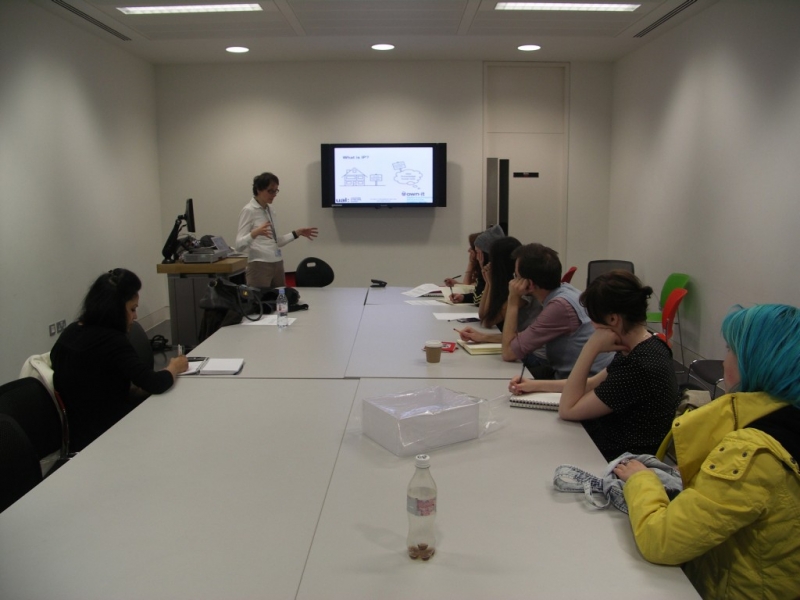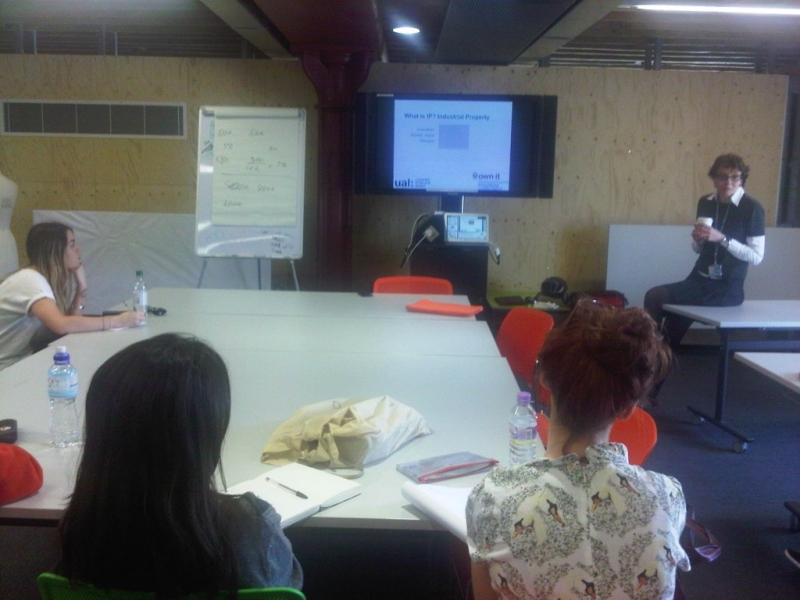POI Programme - IP and Creative Commons Sessions Feedback
In April and May we finally saw the launch of DIAL Professional Online Identities project (POI). A series of talks, workshops, drop-in sessions and other activities have been organised and are still running as part of the POI programme.
Please see some of the feedback below, gathered during the workshops:
A mystery revealed - Copyright, design, trademark and patents
Creative Commons - sharing and promoting your work online
Silvia Baumgart has led the Project and it has been organised together with the Centre of Performance Course. The sessions were scheduled for the 3rd and 15 of May 2013 – CSM.
Silvia works is with Own-it a UAL service that provides advice, information and learning resources on copyright, design rights, patents, trade marks, branding, confidentiality agreements, licensing and other IP related contracts. Own-it delivers workshops for students as well as responding to queries through our online enquiries system.
Overview
Creative Commons is sometimes misunderstood as providing some sort of alternative to copyright. In fact, the whole system is based on the principle that authors of creative work should keep control over their work. It is a simple to use and effective licensing system, which makes it easy to share work with others and promote yourself online.
The Professional Online Identities project aims to identify and support development of specific digital literacies/hard and soft skills (Presentation and Relational skills) in maintaining professional online identities with the aim of enhancing student/graduate employability and industry readiness.
The session followed a previous session held on the 3rd of May on Copyright, design, trademark and patents, which looked at the reality of A & D students, who constantly create work, which is protected by copyright or design right. As well as the likelihood of using other people’s work, which are also protected by certain rights while you are researching and developing projects. The aim was to make students aware of these rights, especially because they would need to promote their work online through social media.

EVALUATION Results
Questionnaire asked to the students after the session.
1. Did you find the seminar useful?
2. How do you think this knowledge will impact on your immediate development?
3. What about the more long term goals?
4. How did you find out about the workshop?
5. Was the communication clear and the booking system user friendly?
6. Any suggestions you would like to make for future activities?
RESULTS - of the group of 7 students
1. Everyone find it useful, we had comments such as: informative, very useful, the second session help to clarify the IP session from last week, etc...
2. All the students asked, stated that they were now more aware of their rights and of what to post online. A students felt that now he would be more confident but also careful in disseminate his images as he felt more able to prevent people from taking advantage.
3. Another student said that she would pay more attention to the images she uses before uploading them online as she may be infringing copyrights.
4. Another student felt that the awareness she gained from these sessions will be not of immediate use but very important for her future job as she wants to start her own business, so it will be useful for her future career.
5. The total number of students attending were 11 for the session on IP and 9 for the session on Creative Commons. To the question on how did they find out about the seminar the majority of the students attending answered that it was on their course timetable and that they did not have to book it. They thought that many students on their course though would not have known about it as more would have attended and benefit from it. ( this comment was on the suggestions question asked) . From these results it seems that including the information into the course timetable is more effective than the promotion via email using the SEE network. Though we did have two students that arrived through the SEE channel and that booked online and that system is very important for alumni that have now left UAL.
6. Regarding the suggestions other points made were:
* More sessions to learn about professional identities, etc… * Let the visitors know about the seminar. * Wanting to learn about ‘How to promote and share my work online’ technically and how to do it professionally. * Another request was regarding location, a student felt that outside the room was too noisy and this was disturbing the session.
Questions asked to Silvia
1. How being involved in the DIAL project has impacted on your activity.
2. Did you find it beneficial?
3. How?
4. What would you like to see in the future?
5. Could you articulate where the project is moving to and what it is contributing towards?
Silvia’s answers
1. Expanded on the development of the content for the IP sessions that I usually teach.
2 / 3. Yes very beneficial. It expanded the channels of promotion via Course directors and the sharing of resources.
4. More diverse content – development of teaching practice/ research into IP issues relevant to digital media practice.
5. Creating new resources we can share: eg: podcast, interview, slides etc…
Overall in my experience is very difficult to engage students in the subject matter of IP but putting it in the context of digital identities make it more relevant to the students so it is a great way of making it accessible. Inserting it in the DIAL project has certainly created awareness amongst the students, who took part and it is more likely that they engage with the Own-It service when they need to later on.
On the question of why it is difficult for students to engage with the subject of IP, Silvia answer was:
IP is a very alien subject and difficult to understand for any person. It is also a subject that is not in the mind of creative students since it is in most cases not relevant to their practice (apart from appropriating or using other people's work in their own work for which they would need permission) but can become very important in their professional lives (when they are more likely to engage with it). IP is mainly seen from the perspective of plagiarism but the emphasis should also be on creating value for creative professionals in their business.
Silvia’s final Considerations
I think that it is really important to find out what is the most effective way of engaging the students to take part in such a programme - timetabling (if possible), Process Art (or any other university blog) - SEE? Or a good mix of everything. I tried to do these sessions with the learning zones (library services) and they put up a lot of posters but I had only three students on the day... Not sure if it's also a time issue? Perhaps we need to start planning earlier so that they have these sessions at the beginning of the new academic year not at the end towards their degree shows.

This Work, POI Programme - IP and Creative Commons Sessions Feedback, by UAL Silvia Baumgart is licensed under a Creative Commons Attribution-ShareAlike 3.0 Unported license.

